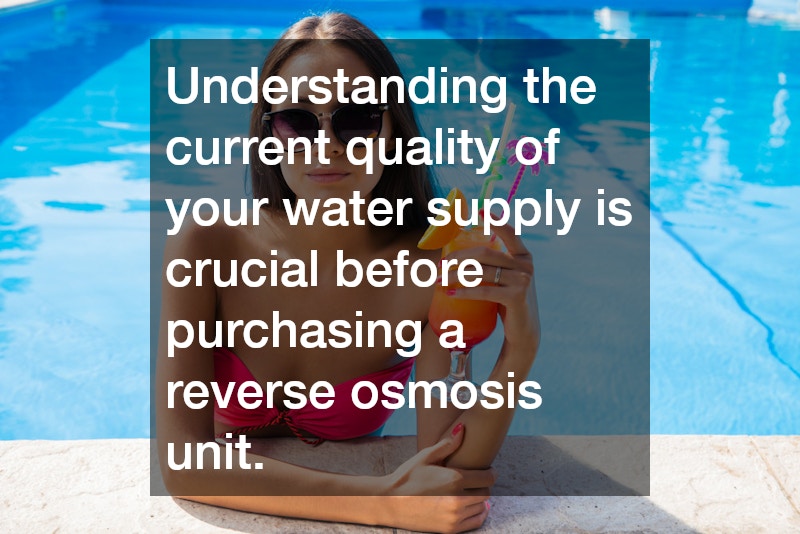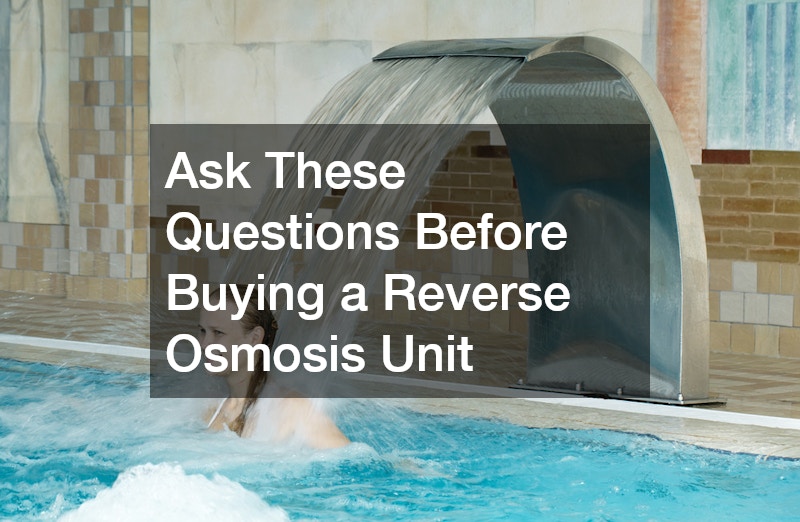Investing in a water purification system for your home is a significant decision, and one popular choice is residential reverse osmosis units. These systems can provide you with clean, safe drinking water, but before you make the purchase, there are several important questions you should consider. In this article, we’ll explore key considerations to ensure you make an informed decision.
What is the Quality of My Current Water Supply?
Understanding the current quality of your water supply is crucial before purchasing a reverse osmosis unit. Get your water tested to identify any specific contaminants present.
This will help you determine if a residential reverse osmosis unit is appropriate for your needs.
Taking stock of your water’s composition will guide you in choosing the right system. For instance, if your water contains high levels of lead, this type of purification system can be beneficial. Knowing the specifics helps in selecting a unit with the right filtration capabilities.
Some municipalities provide annual water quality reports, which can be a useful starting point. However, private well owners need to be more diligent in their own testing. Understanding what impurities need to be removed will help you tailor your system choice accordingly.
What is the Capacity I Need for My Household?
Different households have different water consumption needs, which impacts the type of reverse osmosis unit that will work best. Calculate your daily water usage to determine the capacity you require. Generally, residential reverse osmosis units with higher capacities are preferable for larger families.
If a unit cannot handle your household’s water usage, it can lead to inefficiencies and higher maintenance costs. Overextending a unit’s capacity can compromise the quality of water it provides. Thus, it’s essential to match the unit’s output with your household’s demand.
While it may be tempting to opt for a smaller system due to cost, this can lead to inadequate filtration over time. Conversely, a unit that’s too large may be an unnecessary expenditure. Assessing your needs carefully will guide you to the right choice.
What are the Maintenance Requirements?
Knowing the maintenance requirements of a reverse osmosis system beforehand can save you time and money in the long run. Maintenance typically includes changing pre and post filters, checking for leaks, and ensuring proper tank pressure. A well-maintained system will last longer and perform better.
Some systems require more frequent filter changes, which can increase the ongoing cost of ownership. The availability of replacement filters and parts is an important factor to consider when choosing a system. Not knowing these costs beforehand can result in unpleasant surprises down the line.
Beyond routine filter changes, periodic sanitation of the system is also recommended. This prevents any buildup of bacteria and prolongs the unit’s lifespan. Proper maintenance is not just about keeping the system functioning; it’s also about ensuring the quality of filtered water remains high.
How Much Space Do I Have for Installation?
Space considerations are often overlooked, but they are crucial when installing a reverse osmosis unit. Be sure to measure the area where the unit will be stationed, including under the sink or in a separate utility closet. Diverse models have different space requirements, so understanding your spatial limits is essential.
Compact models are available but may sacrifice capacity or filtration efficiency. Larger systems might offer better performance but require more installation space. It’s important to strike a balance between unit size and available space.
Consultation with a professional installer can also provide insights into space requirements and installation feasibility. In some cases, modifications to existing plumbing might be necessary. Taking space into account will help in making a seamless addition to your home water system.
What is My Budget?
Understanding your budget is key when investing in any home appliance, and a reverse osmosis unit is no exception. Initial purchase prices can vary widely depending on the brand, capacity, and additional features. Allocating a budget for installation and ongoing maintenance is equally important.
While premium models often provide high efficiency and additional features, they come at a higher cost. Balancing upfront costs with long-term performance and durability is crucial. A well-researched purchase can lead to significant savings over time.
There are affordable options that can still provide excellent water filtration without unnecessary extras. Evaluate your needs and financial constraints to find a unit that meets your requirements. A well-chosen system should offer both quality and value, aligning with your budget and water purification goals.
.





